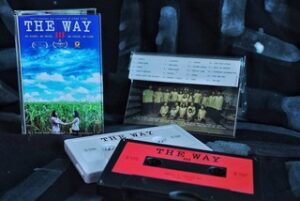by Anna Violante
Near a jungle on the Thai-Myanmar border, a group of about ten people have gathered in a field and are sitting on the ground. Their voices unite in a song that echoes with a call for peace. Three white lines are visible on their cheeks, symbolising the enduring strength of family ties and brotherhood.

These men, women and children share a common plight – they are exiles and refugees who have sought sanctuary in Thailand. The catalyst for their displacement was an arrest warrant issued in the tumultuous aftermath of a military coup that plunged Myanmar back into the grip of a harsh dictatorship. The song ends and the scene shifts to the group busily building a house in a carpentry workshop. This construction is a metaphor, symbolising their heartfelt desire to return to Myanmar – a home where they hope to coexist peacefully with the Country’s diverse ethnic groups.
While the atmosphere inside the carpentry workshop is cheerful, just outside, a ‘bomb field’ sign serves as a stark warning of the potential danger of returning to Myanmar. A mysterious orphan girl suddenly appears. The initial reluctance to approach her gives way to the joy of welcoming her into the family. At one point, a man who had been forced to leave his baby daughter in a village while fleeing the military frightens her with a caress, but soon harmony is restored. Tormented by guilt over the loss of his infant, the man vanishes in the forest. Suddenly, a bomb shatters the community. The man trying to reunite with his child is hit. The group reassembles in the field, singing through their grief: “We are united, even in pain. We won’t let our family fall”. In the face of adversity, their resilience prevails.
Shot on an iPhone 13, the film is the first musical in Myanmar’s history. “I decided to make a musical because I’m a singer and I wanted to prove that creativity cannot be stopped by the tyranny of the military.” Author and director Lynn Lynn tells us. Lynn Lynn was already a renowned musician and composer in Myanmar when he decided to volunteer to serve as Aung San Suu Kyi’s bodyguard during her campaigns from 2010 to 2020 while maintaining his singing career. Reflecting on his creative journey, he says: “I have been composing songs for myself and other singers since the early 2000s, but I have never had complete freedom to express my ideas. Even during the transition to democracy, certain rules had to be followed. My songs are not strictly political, they are about human solidarity, they call for peace and harmony.”
His gentle temperament comes through also when he talks to you, and it’s hard to imagine him as a dangerous person. But he and his wife, well-known actress Chit Thu Wai, were issued with arrest warrants for their opposition to the 2021 military coup, and their home was sealed off by the military council right after the takeover. They arrived in Mae Sot after months in hiding.
When Lynn decided to create a musical that could reach a global audience and raise awareness of the suffering of the Burmese people under the junta, he knew the dangers of filming in Mae Sot, so close to Myanmar, as military spies could potentially abduct or harm him and his cast. He also remarks: “As a refugee, it’s difficult to get permission to film in the places you want, so I had to film in secret”.

“The Way” won several awards, including Best Mobile Feature Film at the Cannes Film Festival in April and the “Festigious” awards for Best Musical, Best First Time Director and Best Song. Unfortunately, Lynn Lynn has not been able to attend any festivals due to his refugee status, which he says has prevented him from leaving Thailand.
To the question: “In how many countries has the film been shown?” He answers: “So far, it’s been shown in 15 countries, in around 40 screenings. But they continue”. The most recent screenings were in Milan and Rome, to large audiences of Burmese expatriates. Lynn Lynn joined his public online at the end of the film. All took part with offers of money to be sent to the resistance in Myanmar, which is currently gaining significant ground against the military and needs financial support more than ever.
Our final question to Lynn Lynn is about his artistic future. “Now I’m working on the post-production of new songs, I am collaborating with other musicians, but it’s difficult to meet, we have to do it online, and everyone does a small part that we will put together. I have a message for Italian producers” he concludes, “if you want to collaborate, call us. Our voice needs to be heard.”
In the photos, Promotional material from the film
























